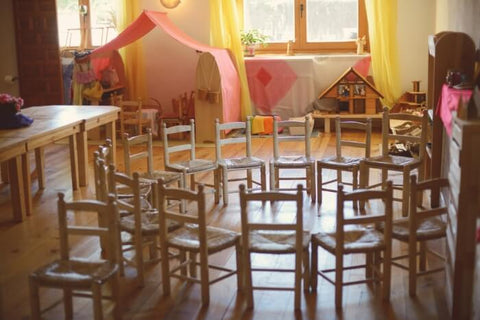The Pros and Cons of the Montessori Method
The Montessori Method of teaching is founded on the belief that children learn best in their own way and at their own pace.
To allow them to do this, Montessori schools allow children to discover a set of educational games and toys as they choose in an unstructured manner.
A Montessori education may be the most suitable primary education for your kids. Defining what method of education method to follow can be tough and it is important to consider all aspects.
Keep reading to learn about the Montessori Method’s pros and cons to help you deiced which method is best for your child.
What is the Montessori Method?

The Montessori Method was developed by Dr. Maria Montessori in the early 1900s. It’s a specific child-centered method of education that involves child-led activities, classrooms with children of varying ages and teachers who encourage independence among their pupils.
Dr. Montessori believed that children learn better when they’re choosing what to learn, and that philosophy is present in Montessori classrooms today. A Montessori classroom likely looks different than what you’re accustomed to.
Things that make it different include:
Montessori Method Pros

1. Promotes Social Interaction
This is one of the most significant benefits of Montessori education. From an early stage, children learn to interact with other children of different ages.
Allowing children of different ages to participate in various activities together promotes peer-to-peer learning. They teach each other, learn from each other and understand the importance of acceptance and inclusion.
2. Practical Learning Environment
Montessori learning environments are built with a lot of space and room for natural light. This is because a beautiful environment with the right learning aids can help the children direct attention to their needs.
The materials the children are allowed to use help them discover abstract ideas and understand complex vocabulary. The materials help these students develop coordination and concentration.
3. It Cultivates Their Love for Learning
Most students in regular schools fail because they don’t love to learn. They see the curriculum as boring, and this makes it difficult for them to appreciate it. The case is different with the Montessori Method.
These students love to learn and are always curious about the world and the people around them. Long-term, they view learning as a lifelong process. It doesn’t stop when school is over.
4. A Broad Range of Subjects Taught
The Montessori Method looks at the whole world as being a potential learning opportunity. They explore various topics, including science, history, and geography, from a holistic standpoint.
There is more time outdoors with the Montessori Method and there are more hands-on projects that are completed in this approach. In return, children stay busy, have fewer distractions, and have the chance to learn more about the world that is around them.
5. Homework is Rare
Although there are programs that do provide homework to students, it is not your typical homework assignment. Students may be asked to journal about their feelings, complete project tasks, or discover something new about their environment. Sending home repetitive problems to solve, like practice spelling tests or math problem sheets, is never part of this educational approach for students of any age.
Montessori Method Cons

1. Independence Can Be A Bad Thing
While the students have independence to learn how they like, the fact is that this independence is not always a good thing long-term.
When a student grows up with a self-guided, independent and entrepreneur mindset, it may become difficult for that student to work with others in the future.
This is because most jobs, if not all, require teamwork. Also, it may be difficult for the individual to submit to management or work in a bureaucratic system.
Montessori students think on their terms as collaboration with other students is not an essential practice in Montessori schools.
2. More Expensive Than Regular Schools
Finding a regular Montessori school with an average to low tuition price is difficult. This is because they put a lot of things into account like the high-quality learning materials, and the in-depth training children receive using those materials.
Only children of wealthy parents can afford to go to a fully functional Montessori school. While some organizations are trying to reduce the expense for children, the cost of getting certified as a Montessori teacher is still high.
3. The Curriculum Is Loose, and the Structure Can Be Intimidating
The Montessori curriculum isn’t as structured as those in regular schools. It has to do with following the child on their learning journey.
This doesn’t mean the children will be allowed to do anything they want, but it is not like a rigid classroom curriculum.
Since the teacher is only present to assist the students rather than enforce certain rules or instruct, students might not pick interest in some important subjects. Curriculum looseness can leave a student over prepared for some classes and not prepared enough for others.
4. Not Every Community has a Montessori School
Although the Montessori approach is common, it is not available in every community. Not every public-school district has a Montessori option. In some communities, only private schools offer this option and some don’t even offer one.
Either way, parents are asked to be more involved with the educational process, including student transportation. Depending on the work schedule for the parent, the asks of the school district may not be something the parents can met.
5. It Can Minimize the Importance of Friendships
The Montessori Method encourages small groups, so students who are engaged with this educational approach are often with the same kids, all the time. Although that can lead to lifelong friendships, it can also minimize the importance of those relationships.
The friendships formed can be seen as part of the educational process instead of being a social component of life. For some students, that process can make it difficult for them to form relationships in the future.
